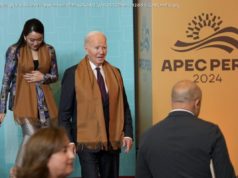Another step in Beijing’s rise to global power.
All wars do end, usually thanks to a negotiated peace agreement. Consider that a fundamental historical fact, even if it seems to have been forgotten in Brussels, Moscow, and above all, Washington, D.C.
In recent months, among Russian President Vladimir Putin’s followers, there has been much talk of a «forever war» in Ukraine dragging on for years, if not decades. «For us,» Putin told a group of factory workers recently, «this is not a geopolitical task, but a task of the survival of Russian statehood, creating conditions for the future development of the country and our children.»
Visiting Kyiv last February, President Joseph Biden assured Ukraine’s President Volodymyr Zelensky, «You remind us that freedom is priceless; it’s worth fighting for, for as long as it takes. And that’s how long we’re going to be with you, Mr. President: for as long as it takes.» A few weeks later, the European Council affirmed «its resolute condemnation of Russia’s actions and unwavering support for Ukraine and its people.»
With all the major players already committed to fighting a forever war, how could peace possibly come about? With the U.N. compromised by Russia’s seat on the Security Council and the G-7 powers united in condemning «Russia’s illegal, unjustifiable, and unprovoked war of aggression against Ukraine,» the most likely dealmaker when it comes to ending this forever war may prove to be President Xi Jinping of China.
In the West, Xi’s self-styled role as a peacemaker in Ukraine has been widely mocked. In February, on the first anniversary of the Russian invasion, China’s call for negotiations as the «only viable solution to the Ukraine crisis» sparked a barbed reply from U.S. National Security Advisor Jake Sullivan who claimed the war «could end tomorrow if Russia stopped attacking Ukraine.»
When Xi visited Moscow in March, the statement Chinese officials released claiming that he hoped to «play a constructive role in promoting talks» prompted considerable Western criticism. «I don’t think China can serve as a fulcrum on which any Ukraine peace process could move,» insisted Ryan Hass, a former American diplomat assigned to China. Ursula von der Leyen, president of the European Commission, pointed out that «China has taken sides» in the conflict by backing Russia and so could hardly become a peacemaker. Even when Xi made a personal call to Zelensky promising to dispatch an envoy to promote negotiations «with all parties,» critics dismissed that overture as so much damage control for China’s increasingly troubled trade relations with Europe.
The Symbolism of Peace Conferences
Still, think about it for a moment. Who else could bring the key parties to the table and potentially make them honor their signatures on a peace treaty? Putin has, of course, already violated U.N. accords by invading a sovereign state, while rupturing his economic entente with Europe and trashing past agreements with Washington to respect Ukraine’s sovereignty. And yet the Russian president relies on China’s support, economically and otherwise, which makes Xi the only leader who might be able to bring him to the bargaining table and ensure that he honors any agreement he signs. That sobering reality should raise serious questions about how any future Beijing-inspired peace conference might happen and what it would mean for the current world order.
For more than 200 years, peace conferences have not only resolved conflicts but regularly signaled the arrival at stage center of a new world power. In 1815, amid the whirling waltzes in Vienna’s palaces that accompanied negotiations ending the Napoleonic wars, Britain emerged for its century-long reign as the globe’s greatest power. Similarly, the 1885 Berlin Conference that carved up the continent of Africa for colonial rule heralded Germany’s rise as Britain’s first serious rival. The somber deliberations in Versailles’s grand Hall of Mirrors that officially ended World War I in 1919 marked America’s debut on the world stage. Similarly, the 1945 peace conference at San Francisco that established the U.N. (just as World War II was about to end) affirmed the ascent of U.S. global hegemony.
Imagine the impact if, sooner or later, envoys from Kyiv and Moscow convene in Beijing beneath the gaze of President Xi and find the elusive meeting point between Russia’s aspirations and Ukraine’s survival. One thing would be guaranteed: after years of disruptions in the global energy, fertilizer, and grain markets, marked by punishing inflation and spreading hunger, all eyes from five continents would indeed turn toward Beijing.
After all, with the war disrupting grain and fertilizer shipments via the Black Sea, world hunger doubled to an estimated 345 million people in 2023, while basic food insecurity now afflicts 828 million inhabitants of Asia, Africa, and Latin America. Should such negotiations ever prove fruitful, a televised signing ceremony, hosted by President Xi and watched by countless millions globally, would crown China’s rapid 20-year ascent to world power.
Forget Ukraine for a moment and concentrate on China’s economic rise under communist rule, which has been little short of extraordinary. At the founding of the People’s Republic in 1949, China was an economic lightweight. Its massive population, 20% of the world’s total, was producing just 4% of global economic output. So weak was China that its leader Mao Zedong had to wait two weeks amid a Moscow winter for an audience with Soviet leader Joseph Stalin just to plead for the industrial technology that would help rebuild an economy devastated by 12 years of war and revolution. In the decade following its admission to the World Trade Organization in 2002, however, China quickly became the workshop of the world, accumulating an unprecedented $4 trillion in foreign-exchange reserves.






